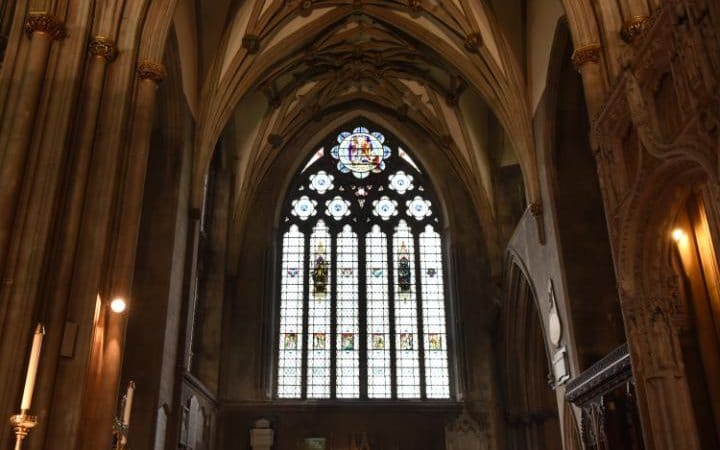We have covered the Confederate windows debate at the National Cathedral and the debate over the parish name at the Robert E. Lee Memorial Church in Lexington, VA and now we have learned of a similar controversy in the United Kingdom. Yesterday, the Bristol Cathedral announced that they are considering removing windows donated by noted slave trader Edward Colston. This is an expansion of the efforts of a local group to rename Colston Hall, a local and well-known performance venue.
From the Telegraph
“Campaigners have widened their focus to include the city’s cathedral, where the largest window pays tribute to Edward Colston and depicts symbols related to his work along with his motto “Go and do thou likewise”, taken from Jesus’ Parable of the Good Samaritan in Luke.
In response to their calls [Bristol Cathedral Dean] Rev Hoyle said: “Opposition to slavery is dead simple. Slavery is wicked and evil.
“Removing the biggest window in the cathedral would be hugely difficult for me. If I can find a way of doing that, I would be perfectly prepared to have that conversation.””
The Dean suggested the Cathedral was caught in a difficult dilemma, and others suggest it is a re-writing of history.
“Colston was a major benefactor, a man of charity. He was also involved in a trade that wasn’t considered evil at the time, but we now know to be wicked. I think that’s a complicated conversation to have.
Christianity generally, and the Anglican tradition, including the Episcopal Church, specifically have had a long and difficult history with slavery. When great Britain emancipated all slaves in its colonies in the 19th century, compensation was paid to slave holders, including members and institutions of the Church of England such as the Bishop of Exeter and the Society for the Propagation of the Gospel. These were paid huge sums equivalent to millions of dollars in today. In 2006, the Church of England formally apologized for their role in slavery and the slave trade.
At that Synod gathering the Rev Simon Blessant offered an emotional support of the apology saying; “the organisation [SPG] owned the Codrington Plantation in Barbados, where slaves had the word “society” branded on their backs” Continuing, he said; “we were directly responsible for what happened. In the sense of inheriting our history, we can say we owned slaves, we branded slaves, that is why I believe we must actually recognise our history and offer an apology.”
While apologies are good and necessary as it causes us to confront and admit the history of our institutions, how meaningful are they if we continue to seek the benefits of our participation in systems of systemic evil? Are we complicit in maintaining the harm of an oppressive sin, even if the systemic sin itself is overturned, by our failure to forego its benefits?” It is these questions that seems to behind the move to remove or alter church windows that either honor, or which were paid for by, those who supported slavery and benefited from it. By worshiping under the images or symbols of the slave-power, isn’t our worship compromised? Isn’t the transcendent beauty sullied?
By continuing to honor men like Colton, are we not suffering the iniquities of past generations and offering up our posterity to the same?
The LORD passed before [Moses], and proclaimed, “The LORD, the LORD, a God merciful and gracious, slow to anger, and abounding in steadfast love and faithfulness, keeping steadfast love for the thousandth generation, forgiving iniquity and transgression and sin, yet by no means clearing the guilty, but visiting the iniquity of the parents upon the children and the children’s children, to the third and the fourth generation.”
Exodus 34:6-7
image: Colton window in Bristol Cathedral

